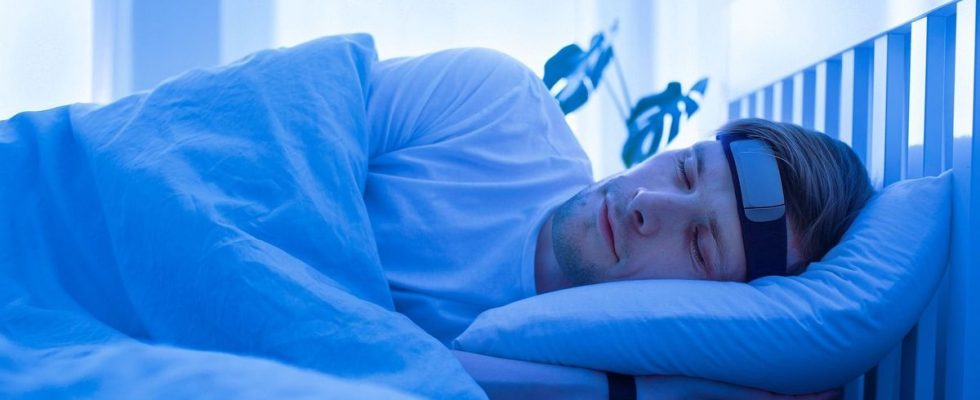Published on
Updated
Reading 3 min.
Technology has contributed to making us lose sleep, but can it give it back to us? Entrepreneurs with insomniacs, inveterate snorers or nap lovers have developed all kinds of electronic gadgets to sleep better.
“Here we have the world’s first artificial intelligence (AI) sleep and brainwave tracker, capable of improving deep sleep and time to fall asleep“, presents Kimi Doan, head of investments at Earable neuroscience.
She came to present at the Las Vegas tech show (CES) the “Brainband”, recently marketed for nearly $500.
Designed in flexible and soft materials, it is worn on the head like a crown. Its gold-plated sensors analyze brain activity in real time and its speakers play music, meditation aids or white noise, depending on the needs detected.
“If you wake up in the middle of the night, the AI will automatically find the appropriate audio content to help you get back to sleep“, specifies Kimi Doan.
A natural and vital phenomenon, sleep has deteriorated due to health problems and/or the stress of modern life. In the United States, according to the Sleep Foundation, nearly a third of adults sleep less than 7 hours per night, the minimum recommended to avoid increasing the risk of cardiovascular disease and obesity.
Not to mention the impact on productivity. “Workplace fatigue costs U.S. businesses about $136 billion a year“, adds the organization.
Dissecting sleep
In 2024, Paul Valéry’s “Sleeper, golden mass of shadows and abandonment” scrolls through content on her cell phone before sleeping, to the detriment of her rest.
The tech response: accessories to analyze your sleep and connected mattresses, which gain in capacity to intervene and interact, thanks to AI.
PranaQ will launch TipTraQ in April, a biometric sensor to wear on your fingertip at night, accompanied by a mobile application, for $200.
Users will be able to consult reports on their sleep phases and communicate with a chatbot based on generative AI, specially trained on a corpus of scientific texts.
The Taiwan-based company hopes to soon obtain medical approval for its device to monitor sleep apnea, often responsible for snoring, a disorder from which two of the co-founders suffer.
Jonathan Berent, founder of NextSense, also has medical ambitions for his earpieces, initially designed to detect and monitor epilepsy.
When they go on sale within a year for $130, they will first be used to analyze and improve the quality of sleep.
“We have found a new way to amplify the most restorative waves of deep sleep“, indicates this former Google engineer.
“When you play pink noise (low frequency waves like waves, editor’s note) during this phase, the brain takes refuge in a deeper stage of sleep“.
“All of this data makes us feel like we can control our sleep. And for some people, it’s useful and motivating“, notes for AFP Wendy Troxel, behavioral scientist at the Rand Corporation.
Consult a doctor online for your sleep problems
Mattresses inflated with Artificial Intelligence
“But the reality of sleep is that the more you work for it, the more it eludes you. And all of these measures can cause anxiety, a state antithetical to sleep“, she continues.
To relax, insomniacs can adopt a Moonbird at 200 dollars. This connected anti-stress ball inflates and deflates in the hand in a captivating way, to guide breathing exercises conducive to falling asleep.
“I was skeptical at first“, recognizes Michael Broes, co-founder of the Belgian start-up, before explaining that these exercises allow you to synchronize your heart rate with your breathing rate, a key element of relaxation.
Another factor disrupting sleep: the temperature of the bed.
“According to our studies around the world, this is the main reason why people feel they are sleeping poorly.“, says Daniela Kooijman of Variowella German company that developed heating and cooling strips for mattresses.
Many manufacturers have in fact invested in temperature control systems in different areas of the body, on each side of the bed.
Like the Chinese company DeRucci, whose AI-inflated mattresses change shape depending on the sleeper’s position and analyze their sleep.
“For ten years we have been researching how to automatically adjust softness and hardness for the individual needs of each customer“, says Zhu Huan, deputy director of the connected sleep division. “AI made it possible“.
